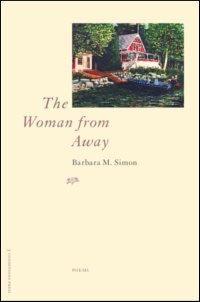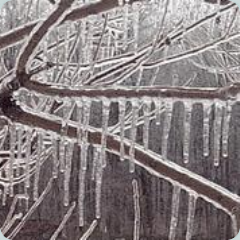Winter 2007
Table of Contents - Vol. III, No. 4
Poetry Essays Fiction Book Reviews
Barbara M. Simon, The Woman from Away, Three Conditions Press, ISBN-13 978-0-9721241-3-3, 158 pages, $14.00.*

There are a number of worthwhile books of poetry published every year by small presses, and the poet’s name has local recognition at best, but wouldn’t make the New York Times or the American Poetry Review or Poetry, but the poems are exciting reading. Barbara Simon’s book of poems possesses the excitement of recognition for the reader. The world she writes about is the world that most of the readers of the Loch Raven Review live in. She writes of suburbia, of the middle class, of gardens and fences, and of relationships, mother-daughter, parents, marriage. However, she is not a Sunday painter of pretty landscapes, or a knitter of rhymes. Her poems are learned, without being pedantic, emotional, without being frenzied and hysterical, or sentimental, cool with reason and reasonableness, but without the sterility and chill that can accompany the intellect.
There is a domestic truth and honesty in the poems, and, though the poems will have a special appeal for female readers, this is not just a woman’s book. Her talent and vision transcends gender. For example, consider this poem, which is typical of her intelligence and intuition:
TranslationThere are deprivations we can stand:
The absence of vision, made bearable
By Braille, a white cane, the soft muzzle
Of the guide dog. Bereft of sound, music—
We are lifted from the silence profound
As stone by gestures that fly---signs
Singing in the air. Given the absence
Of taste or smell, we would continue
Bland---a world of white bread and skim
Milk. Missing touch, the oxygen
Of humanity, we would shrivel. Our
Names would shrink to labels, no one
To hold our hand, to caress our cheek,
To reach for us. We would be unwrapped,
Warped, barren, skeletal and raw
Like survivors of fire. We would lie
In beds cold as January, dreaming
Of empty arms and syllables filled
With the hollowness of o’s---alone, solitary,
Sorrowful.
Ms Simon’s talent and scope shows through. Look at those last words “alone, solitary, / Sorrowful” . Each has at least one “o”. The vacancy in the midst of the word, in the meaning of the word, in the center of the letter “o”, which is also the sound of lament. The poem presents us with the effects of such basic deprivations, though in the case of sight and sound there are compensations, different means of perception. However, in “missing touch” there is really no compensation, but is the touch referred to just a matter of a physical sense, or is it a metaphor for love and affection?
Ms Simon’s diction reminds me of Billy Collins. Her poems are easy to read, but colorful and precise with imagery. There are striking metaphors and fresh ways of seeing both mundane and emotion-filled scenes.
Barbara Simon died in June of this year after six months of fighting pancreatic cancer. A number of poems were written after her diagnosis. That may have occasioned the subject, but the insights were gifts that she left to us. Considering the biographical element, the poem below takes on even greater significance:
When Death’s The Visitor
Somehow
Rooms wear the smell of old women---
Something overripe, not quite clean.
Even at noon, corners harbor secrets,
Messages of spent passions,
Old blood. The lamp by the bed
Spills a cataract of light,
Bathing the scene in a milky glow.
Awed by the sounds of dying,
The scent of decomposing,
The family draws close. Still as candles,
They hold their loved one in the flame
Of their gaze. The loved one lies, pale
As a spent gardenia, life a fragile moth
Struggling to escape the burning
Promises singeing the praying lips:
“Please stay, give us just one more
Tomorrow, without you we can’t…”
The words fall like petals,
Their power only
For the living
Who cling to them
As they turn from the bed,
Prayer for the empty body
All the sorrow they can hold.
The Poetry in The Woman from Away is not solely about loss, though it does figure in the poetry as it does in life. The poems celebrate the mother-daughter relationship as in Mom, love, passion, domesticity, all contained in Why to Build a Life. There are poems that celebrate both the place and the time of summer vacations in a lakehouse in Maine that the poet owned. Poems celebrate and explore the meaning of diverse writers like Jane Austen, Raymond Carver, Baudelaire, Wallace Stevens.
Below is a poem that captures the essence of Barbara Simon and her poetry:
Why We LiveAh to go out the way daffodils do.
Their ending an imperceptible process,
The white and yellow draining
From the petals and as the color fades
So too the pliant blossoms until
In the afternoon the sunlight catches
The curled leaf, the parchment brittle twist
Of trumpet. The bloom stares back at
Death. Not that It’s ugly.
The daffodil, the jonquil, the glorious narcissus
Rise above their fate, their dying a grandeur.
They stand in the vase a day or so
Past life like Lenin in the Kremlin,
Like Sleeping Beauty in her glass casket.
No kiss to wake them---reminded
With such beauty in their going
What reason for our living?
* Anyone wishing to order Barbara's book may do so by can send a check (made out to either Three Conditions Press or Maryland State Poetry & Literary Society [MSP&LS]) for the book plus $2 for shipping and handling to MSP&LS, Drawer H, Baltimore, MD 21228. MSP&LS is a non-profit, tax-exempt organization.
© Dan Cuddy
